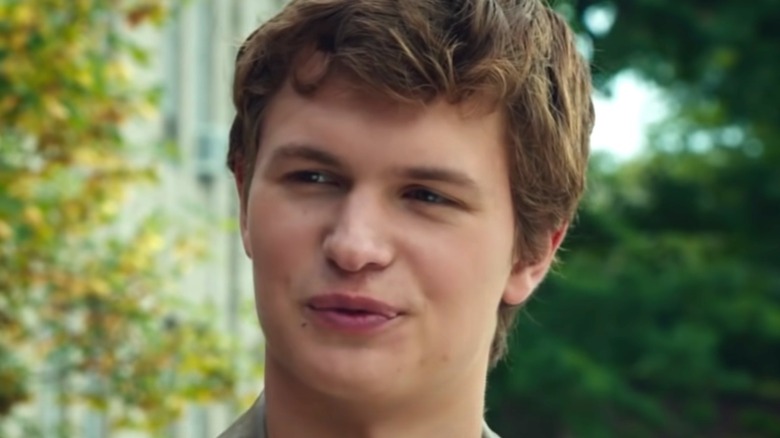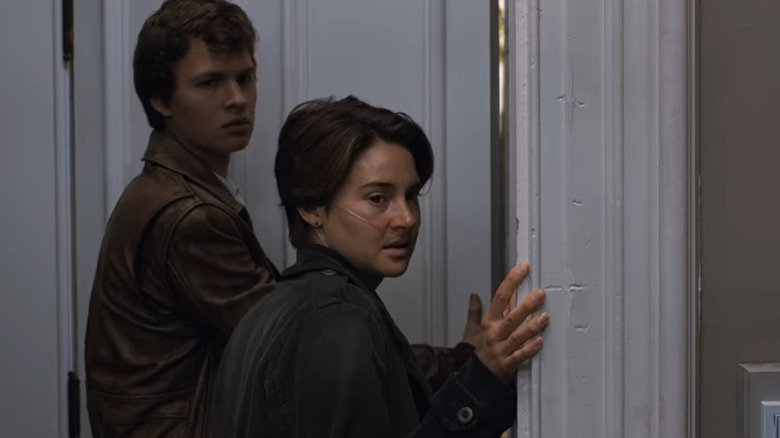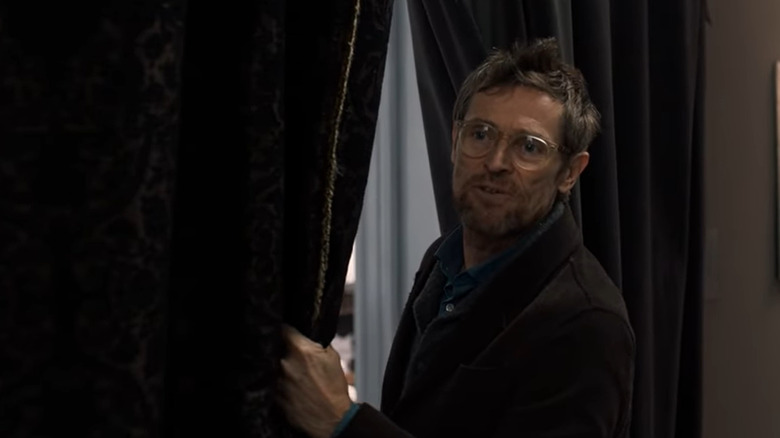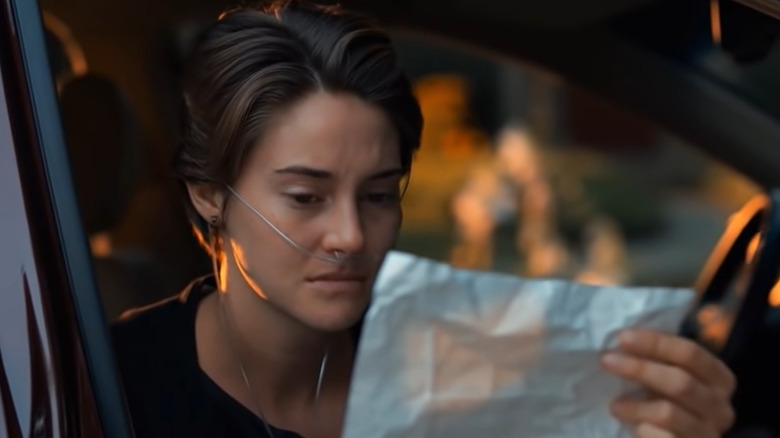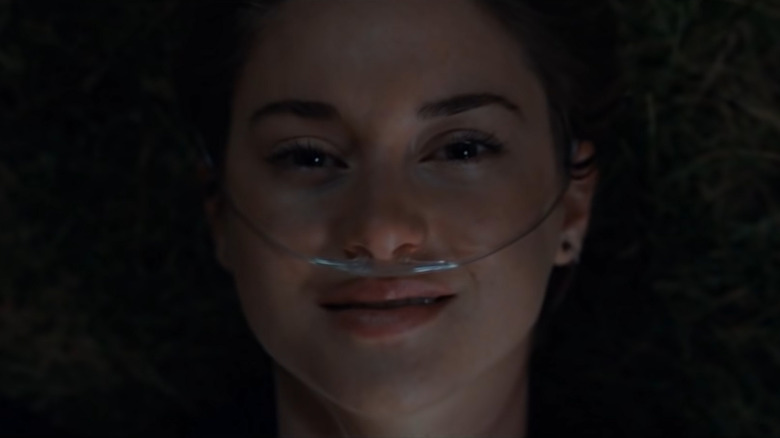The Ending Of The Fault In Our Stars Explained
In the 2014 film "The Fault in Our Stars," Hazel Grace (Shailene Woodley) is a teen with cancer, forced to attend a support group by her mother. At one of the meetings, she crosses paths with Augustus "Gus" Waters (Ansel Elgort), an amputee in remission. The two quickly form a bond that spirals into a romance. Laura Dern, Sam Trammell, Nat Wolff, and Willem Dafoe co-star in the adaptation of the bestselling novel by John Green.
The movie received great critical reviews and was a hit with audiences, turning a profit of more than 25 times its budget internationally (via BoxOfficeMojo). The use of the lovers' "Okay? Okay." mantra found its way into social media posts and high school relationships across North America. In most ways, the movie proved inescapable for a while (via Vulture).
Yet, beneath the seemingly cliché-riddled story of ill-fated teenage love, a deeper, more personal, non-romantic story was told.
An Imperial Affliction
Prior to meeting Gus, Hazel is isolated in her world. She has no close friends and keeps a distance from her parents. She wants to minimalize the damage her death will cause, evidenced in her "grenade" monologue. She's diagnosed with depression, an effect of which is her obsessive rereading of the novel "An Imperial Affliction." Gus and his friend Isaac (Nat Wolff) are the first new people she lets into her life in years.
Hazel shares "An Imperial Affliction" with Gus, which is about a girl, Anna, struggling with and ultimately dying from cancer. But the book ends abruptly in the middle of a sentence and provides little resolution. Many of Hazel's lingering questions about the story revolve around the supporting characters, wondering how they move on after the girl's death.
Hazel's obsession with the novel can be considered a metaphor for her lack of control. She's not only a teenager with limited freedoms, but also has an incurable disease — traits she and Anna share. Rereading the novel is one of the few things she can control. Where "An Imperial Affliction" ends both tragically and vaguely, Hazel hopes for a different ending for herself. She refuses to live happily in the present and to think of her life as something of joy.
Gus develops many of these obsessions since he's scared of oblivion, but he has the means to confront the uncertainty of "An Imperial Affliction" head-on: his Make-A-Wish.
If you or someone you know is struggling with mental health, please contact the Crisis Text Line by texting HOME to 741741, call the National Alliance on Mental Illness helpline at 1-800-950-NAMI (6264), or visit the National Institute of Mental Health website.
Amsterdam and Van Houten
Gus uses his Make-A-Wish request to take Hazel and her mother to Amsterdam, where between the tourist attractions and lowered drinking age, they plan to meet the author of "An Imperial Affliction," Peter Van Houten (Willem Dafoe). However, things turn out worse than planned. Not only is Van Houten not expecting them (the visit was secretly planned by his secretary), he's hostile and enraged by the duo's desire for resolution. He angrily explains life does not often provide clarity and that his characters are fiction — they cease to exist after the back cover is closed.
Instead of providing answers, the visit challenges Hazel and Gus to accept the uncertainty of the novel and their reality. Van Houten asks of the teens as they storm out of their meeting, "Have you ever stopped to ask yourself why you care so much about your silly questions?"
The imposing question rings true for Hazel, who knows that her obsession with the book is dictated by her life choices. She's minorly questioned these choices before but never been directly confronted about them until meeting Van Houten. Her personal connection to his work only makes the defeat worse. Her hope for closure bursts after the encounter.
Not giving up hope, Gus promises to still find answers, even if that means writing Hazel a sequel himself. Then he drops a major bombshell: his cancer has come back with a vengeance and he's not expected to live much longer.
Gus' final question for Hazel
After returning from Amsterdam, reality sets in. In a touching scene, Gus holds a fake funeral service where Hazel reads his eulogy. Rather than mourning him, however, Hazel takes a different approach: she thanks him for the time he allotted her and confesses how happy she's become. Not long after, Gus dies, decimating Hazel's newfound optimism. Among the broken hearts at the funeral, Van Houten appears, gifting Hazel a letter Gus wrote.
The letter is Gus' eulogy for Hazel. He recounts the depths of his admiration for her, and a philosophy that he's developed over the course of the story: "You don't get to choose if you get hurt in this world, but you do have a say in who hurts you. And I like my choices. I hope [Hazel] likes hers."
Rather than ask Hazel to feel sorry for him or herself, he fondly remembers the love they shared. He chooses to ignore the bad in favor of the good, to accept the uncertainty and the inevitability of his death rather than spend any more time in fear. Then, at the end of the letter, he asks Hazel to do the same.
In the final moments of the film, Hazel admits to liking the choices she's made, which signals a massive turning point for the character.
Hazel accepts oblivion
With the final line "Okay" spoken by Hazel in response to Gus' question, she accepts the uncertainty and heartbreak of the life she leads to also embrace the fond memories and the future. This creates a full-circle moment, echoing the eulogy scene where Hazel seems to be testing the waters of optimism. Though Gus still succumbs to cancer by the finale, his presence in Hazel's life matters. He experienced happiness with her and loved her in spite of their shared uncertainty. The letter explains that Gus knew he had cancer since around the time he and Hazel met, longer than he admitted to, but he chose not to tint their relationship with the news.
Gus helps Hazel make the significant change to live her life in acceptance of the inevitable oblivion Hazel mocks at the film's start. This action will in turn affect all those still in her life — her parents, Gus' parents, Isaac — and finally let her open up to letting others in.
Hazel's cancer might not be cured, her obsession with "An Imperial Affliction" not quite over, but through this distinct and subtle choice, she is able to give herself some inner peace and move on. The love story of "The Fault in Our Stars," while the most identifiable aspect of the film, serves a deeper purpose of a person's journey to change the guardedness with which she lives her life.
